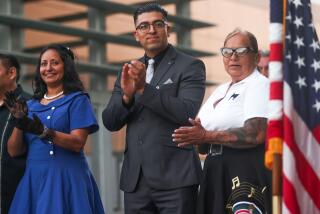Column: ‘Mayor’ shows the West Bank as we rarely see it
The mayor is busy all the time. A local school needs better plumbing and doors that stay shut. A new plaza threatens the destruction of a public restroom for women. The Christmas tree lighting ceremony is in its final festive planning stages. There is a sewage issue in the valley, and the city is still trying to figure out its brand.
“That’s not a brand, that’s a slogan,” the mayor says in a meeting he leaves early to make yet another meeting. “I don’t think we understand what branding is.”
Although this mayor appears to be particularly beloved — and indeed after just a few minutes it is difficult not to fall a bit in love with him — this could be any city, really. Except for the language, which is Palestinian Arabic.
This mayor, the titular character of “Mayor,” a documentary by David Osit that premiered at this year’s True/False fest, is Musa Hadid, the mayor of Ramallah, the small West Bank city that is the de facto capital of the Palestinian National Authority.
As the film shows, Hadid travels the world promoting his city — this month Ramallah became the twin city of Oxford, England — and calling for an end to Israel’s occupation of Palestine. (He would have made an appearance at True/False in Columbia, Mo., had the novel coronavirus not ended all nonessential travel for Palestinian officials.)
But as the film also shows, he spends much of his time taking care of this city of 57,000.
High in the Judean hills, 10 miles south of Jerusalem, a Muslim majority lives peacefully with a strong Christian minority. Bars, cafes and fast-food chains abound; women walk with their heads uncovered. The city’s slogan, We Ramallah, has a hashtag and a sign that unapologetically echoes the I Amsterdam sign, and there isn’t a camel in sight.
It’s an ancient and secular city, which, though surrounded on all sides by Israeli settlements and soldiers and containing its own refugee camps, bears little resemblance to the strife-filled and often sinister depictions of the Middle East that fill American film and television. A city where, as depicted in “Mayor,” the Muslim call to prayer occurs literally alongside the pealing of a church’s bells.
“I must have shot that 16 times,” Osit says, laughing. “It meant so much of what I saw in Ramallah and I wanted to get it right. I can’t count the number of times I have seen a scene in which a call to prayer is portrayed as something ominous,” he adds. “You know, with the music and the sunset and the camel against the sunset. Even signs in Arabic are often used as a signal for unrest.
“Ramallah challenges a lot of people’s notions about Palestine,” he says. “It’s green, it snows in the winter, the mayor is, by law, a Christian.”
Which doesn’t mean, he hastens to add, that we should care more about Ramallah because Christians live there. “I just wanted to challenge people’s notions about Palestine.”
“Mayor,” which he filmed over 18 months, is aimed at Westerners, particularly Americans. “I wanted to make a film so that the next time an American gets in an argument about Palestinians and Israelis, they think about something more than generalities.”
Osit is an American filmmaker whose last documentary, “Thank You for Playing,” won the 38th News and Documentary Emmy for Outstanding Arts and Culture Documentary. He spent time in the Middle East as a student at the University of Michigan and first visited Ramallah as an editor on a film by Mohanad Yaqubi. Struck by how the city challenged his own preconceptions, Osit wondered how he could deal with that contradiction in a film of his own. When Yaqubi visited Osit and his partner, filmmaker Lana Wilson, at their home in New York, Osit asked him what the mayor of Ramallah was like.
A kind of cool, visibly soulful civil engineer who believes in the power and importance of the municipality, as it turns out. Who occasionally indulges in an e-cigarette.
The film, which goes to the Copenhagen-based festival CPH:DOX this month, opens as Ramallah prepares for Christmas 2017.
“I was surprised that Christmas was such a big deal in Ramallah,” he says, “but when I talked to people there they reminded me that Jesus was born 10 or so miles away so he’s kind of a hometown hero. And since I am a Western filmmaker, I wanted to take my cues from the municipality, and they are very excited about Christmas.”
The timing meant that Osit was in Ramallah when President Trump announced that the United States was recognizing Jerusalem as the capital of Israel and would be moving its embassy there from Tel Aviv. Osit learned of the decision, which was rejected by the Palestinians and a majority of world leaders, as Mayor Hadid did, during a meeting with a local priest. (In a scene both troubling and hilarious, Hadid reveals that he does not have cable television or use social media. “Get me a radio,” he yells to his assistant. “Why is there not a radio at least?”)
The film continues to follow Hadid as he grapples with local issues, including the creation of a dancing waters fountain and adjacent cafe in the plaza outside city hall, which serves as something of a narrative throughline.
But the fear, anger and tension caused by Trump’s announcement simmers continually in the background — Hadid decides to stop lighting the Christmas tree at night — and creates new problems, including Palestinian protests. Though part of the Israel-occupied West Bank, Ramallah is in Area A, which means it has a Palestinian police force, but the border is visible from the Judean hilltops. In one scene, the mayor watches as Israeli soldiers confront Palestinian protesters, firing shots as some flee. In another, Israeli troops come into Ramallah, searching for security tapes that could reveal the movement of protesters who shot at the soldiers.
“When I started filming, I had wondered how the conflict would affect the film,” Osit says. “Because Ramallah often feels so separate from it. But Trump made his announcement the fifth day of filming and I thought, ‘Well, that’s how.’”
Osit says he would film in Ramallah for a month or so, then fly back home to translate what he had shot. While he was making “Mayor,” he and Wilson were living in Los Angeles, where Wilson was finishing the Taylor Swift documentary “Miss Americana,” which debuted on Netflix this year.
“It was interesting, us both working on such different films at the same time,” Osit says. “Though I’ve had several people tell me they are very similar, which is a bit weird considering the subjects but I guess makes sense in that we both followed one person around for months at a time.”
Osit and Wilson have been a couple for four years, having met through the smallish world of documentary filmmakers, and though Osit says competing careers have never been a problem — “Lana is the person whose opinion I respect the most in this world” — the secrecy that “Miss Americana” required was a bit odd.
“There we were in L.A. and we couldn’t really explain why,” he says.
Wilson accompanied Osit to True/False, where she was mobbed by fans at one event that took place before “Mayor” screened, while Osit sat by himself. That changed, however, after “Mayor” debuted to a full-house standing ovation in the 1,700-seat Jesse Auditorium.
“I was astonished at the reaction,” Osit says. “An Israeli woman came up to me and said she had been nervous about coming to the movie, but she was so glad she did, and an Arab woman told me she was grateful to be seen for once.
“I was devastated that Mayor Musa missed it — I’m not sure how many chances a Palestinian politician can have to see over a thousand Americans in the Midwest standing and cheering for them.”
Osit knows that Israeli/Palestinian relations are a fraught topic, and he doesn’t want anyone looking at “Mayor” as a political prescription.
“I don’t have a solution to the crisis in the Middle East,” he says. “I don’t believe that enfranchising one group of people at another’s expense is a good idea, but this film is not about that.
“A film can’t give you everything, and if it tries then you lose the power of storytelling. This is a fable about a man trying to do good in a place you think you know.”
More to Read
Only good movies
Get the Indie Focus newsletter, Mark Olsen's weekly guide to the world of cinema.
You may occasionally receive promotional content from the Los Angeles Times.











